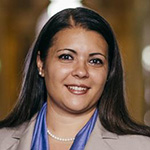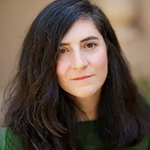Muslim and Jewish leaders urge rehumanization amid Israel-Palestine conflict, emphasizing shared grief and dialogue. (GV Wire Composite/David Rodriguez)

- NewGround convenes diverse groups to discuss challenging questions surrounding the Israel-Palestine conflict.
- The authors stress the importance of recognizing specific lives lost and resisting dehumanization of either side.
- Expanding capacity for empathy and grieving together are key steps towards finding a permanent solution to the conflict.
Share
|
Getting your Trinity Audio player ready...
|
Several weeks ago, we convened a group of Muslims and Jews in our network to talk about the unrelenting pain we have been experiencing on, before, and after Oct. 7, 2023, when everything that was already so broken in Israel-Palestine became exponentially broken.

Aziza Hasan
Opinion

Andrea Hodos
Opinion
It was days after the discovery of six Israeli hostages shot dead just before their captors fled. “I feel like I am mourning for Hersh (Goldberg-Polin). I feel like I knew him,” said Ryan, who is Muslim. His grief was palpable. Deeply authentic. His words hung heavy in the air.
Then after a breath, he continued with equal weight, “And I can’t help wondering how many Palestinian Hershs have also been killed, along with all of the life and potential that lay ahead for them.”
In the words of Hersh’s mother, Rachel Goldberg-Polin, “The time has come to be human.” She was exhorting negotiators and national leaders on CNN, but this holds true for all of us. As scared, infuriated, and desperate as we may feel right now, we need to remember that our fates and interests are intertwined. If we cannot find one another’s humanity, we risk our collective future.
Related Story: Takeaways From AP’s Report on the Dilemmas Facing Palestinian Americans ...
Bridging Divides Through Dialogue
We have worked together over several decades at NewGround, a Los Angeles-based organization that empowers Muslims and Jews to bridge divides that threaten both our communities’ well-being and our fragile democracy. This past year, we and our staff have convened diverse groups of Angelenos around the most difficult questions of this moment — from “Does the phrase ‘From the River to the Sea’ mean the elimination of Israel — or of Jews?” to “Is Israel committing genocide of Palestinians?”— in a space where holding on to one another’s humanity is possible.
Our network includes Jews, Muslims, and at times people from other faith communities, some with deep connections to Israel and Palestine, some without personal connections at all. We know that the conflict in Israel-Palestine is political and that there are always religious overtones to it, and we know that not all Palestinians are Muslim and that not all Israeli citizens are Jewish. Nevertheless, no one in the NewGround network has been left untouched by the impact of the violence there and the polarization here.
And the hardest part has been trying to help even our own people to resist the dehumanization of one group or another. Our brains are wired to homogenize people we perceive as outside our “tribe”—a tendency that increases dramatically in high conflict.
We see how hard it is for some Jews, Israelis, and others to imagine Palestinians as parents who love their children. And how demoralizing it is for Muslims and Palestinians to have to prove their humanity at this most basic level. Muslims find themselves asking questions like, “How can killing 200 Palestinians to rescue four Israelis be justified?”
We see how difficult it is for some Muslims, especially Palestinians, and others deeply concerned for them, to see individual Israelis as anything other than evil aggressors. Jews and Israelis find themselves wondering, “How can you not see mothers taken from children, children taken from parents, people who have been working toward peace killed in homes and fields?”
Interests coming from many directions have been working overtime to convince us that only one group or the other has humanity and value. This is especially difficult terrain to navigate for individuals who have direct personal experience and trauma connected to one side or the other.
Related Story: Palestinian American Shares His Thoughts About the Close Israel-US Alliance
Creating Space for Authentic Dialogue
In the conversations we convene at NewGround, we strive to create conditions that help people share their pain and perspectives authentically — giving them the resilience to witness the pain of others, who can then, in turn, soften and open themselves to a wider range of perspectives. We pose hard questions where we know there are big differences, then ask people to stand on a spectrum of agreement and disagreement before speaking to why they chose to stand where they did.
Or we might do a fishbowl exercise, inviting Muslim and Jewish participants to create two concentric circles, both facing inward. The outer circle listens — not talking — as members of the inner circle—either Muslim or Jewish—speak one-by-one and in discussion, in response to a hot question. When the first conversation concludes, the circles switch places. Afterward, the whole group talks. Working with a heterogenous group of Jews and of Muslims, at times with other faith communities present, ensures that participants can better grasp all that is at stake, rather than remaining in binary thinking.
It takes discipline to process our own pain, create space for our tears to flow instead of suppressing them, and care for the pain of others. It takes humility, especially amidst deep vulnerability, to say, “I don’t always understand, but I know I need to.” We continue to rededicate ourselves to holding tight to values expressed in both traditions: Each life is an entire world, and kindness and justice must walk hand in hand. It’s beyond challenging and yet it is essential.
Truly rehumanizing one another’s people requires recognizing specific lives lived and lost, not merely speaking of a generalized “suffering” of one group. Knowing people’s names and who they might have become in the world. Describing the hell in which people are continuing to live. Understanding that neither of our communities are monoliths.
So we remember the death and life of Palestinian poet Refaat Alareer, whose final interview with CNN was broadcast, per his request, only after he was killed on December 7, 2023. In the interview, he described the feelings of despair as a parent powerless to protect his children. Unimaginable calculations such as: “How can you hug your child so as not to scare them with what might feel like a ‘farewell hug’?” “Should we sleep in the same room so that if we die, we die together, or divide into two rooms in case some of the family might survive?”
And we remember the death and life of Israeli peacemaker Vivian Silver, who was killed on October 7. Hiding in her home’s safe room on Kibbutz Be’eri, Vivian—angry at being forced to articulate a one-sided position—argued with a radio interviewer. “If I survive, then we will have a deep and complex conversation about two sides,” she told him. Her son, Yonatan Zeigen, is now engaged in peacebuilding full-time, and recently shared how moved he was to learn that a soup kitchen had been set up in Gaza in his mother’s name because of the relationships she forged with people there.
Related Story: Palestinian Olympic Team Greeted With Cheers and Gifts in Paris
Expanding Capacity for Empathy
We are working hard, and against the grain, to expand the capacity for our people — and those beyond our network — to hold all this humanity and all this loss together. It takes courage and strength to look at someone else’s pain when you are in deep pain yourself. Especially when it feels threatening to do so because you know their pain is being used by others to delegitimize your own.
We learned from the late neuroscientist Emile Bruneau that dehumanization builds in the gap between excess empathy for one group, and lack of empathy for the other. His findings on empathy and conflict resolution have helped us understand so much about our work in perspective building and conflict transformation. Unfortunately, at this moment, as we look out into rhetoric and actions in our broader communities, we are seeing much of what was described in his studies bearing out between our larger communities, both in Israel-Palestine and here at home. We are seeing things like triumph and glee at pagers exploding in grocery stores, or calls for all Jews to “go back to Poland.”
We know that the only antidote to this kind of dehumanization is inviting people toward rehumanizing one another. This will not stop the violence right away. But it is part of the calculus of any permanent solution to the conflict. And one powerful form of rehumanization is to grieve all of our people together, as Palestinians and Israelis do every year at a joint memorial ceremony.
In a session earlier in the year, one of our Jewish members, Eli, reminded us of the philosopher Judith Butler’s concept of “grievability.” Butler asks us to be attentive to whose pain, whose humanity is grievable, and whose isn’t. Grievability can shift depending upon the context, but it tends to fall where forces of power are concentrated. Speaking very generally, in mainstream American politics and media, Israeli lives are grievable and Palestinian lives much less so. On “the street” (including lots of social media and alternative spaces), Palestinian lives are grievable and Israeli lives much less so (and there is also a kind of power here, of a different nature). In the 2017 study “The Enemy as Animal,” Bruneau and psychologist Nour Kteily found that even in asymmetrical conflicts, symmetrical dehumanization contributes to prolonging violence.
These critical insights, along with those of civil rights scholar john a. powell, who urges us to “be hard on structures and soft on people,” remind us to acknowledge and address power imbalances and to remember that pain is pain and must also be acknowledged and addressed for us to move forward together.
So our ask is very simple, yet extremely difficult: Seek out, listen to, and grieve one another’s stories. Even — and especially — when it is the hardest. Resist the way your anger and despair might pull you away from another’s humanity. Even righteous anger has an insatiable appetite; it can rob you of your own humanity and impact the way you become with others, including your loved ones. Re-member one another, and please remember for yourself: A key to stopping the violence permanently is to see beyond the exclusive, “us or them” view the world prefers, and expand our lens to a larger scope of dignity, security, and justice for all.
About the Authors
Aziza Hasan and Andrea Hodos are executive director and associate director, respectively, of NewGround: a Muslim-Jewish Partnership for Change. You can learn more about their work here or in any of this recent coverage of their work. This was written for Zócalo Public Square.




















